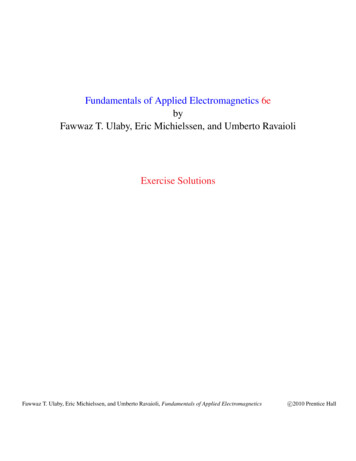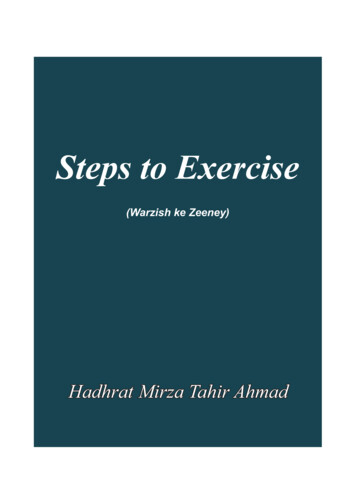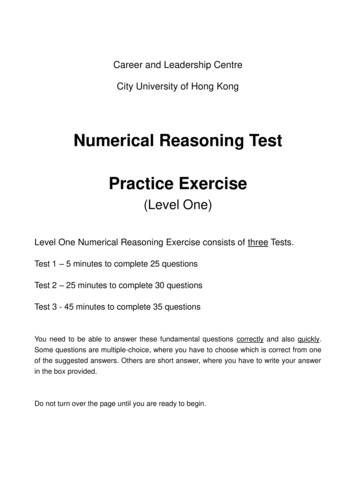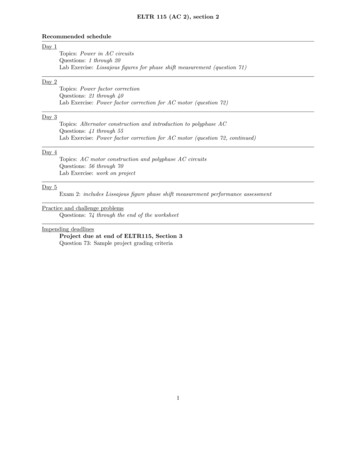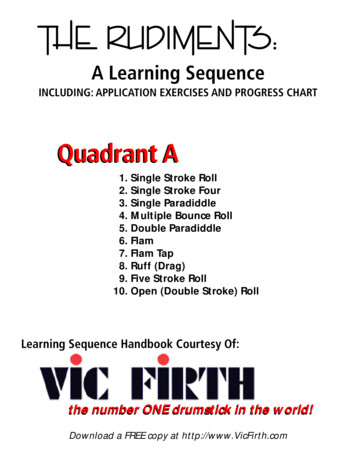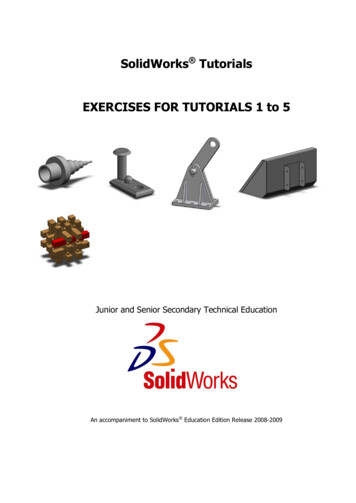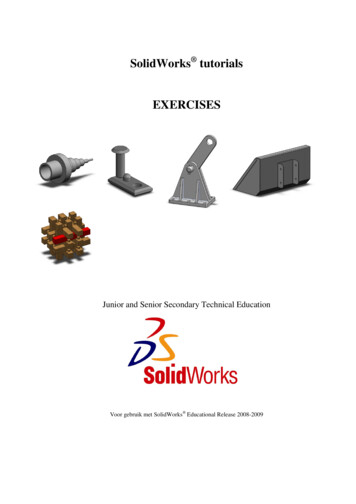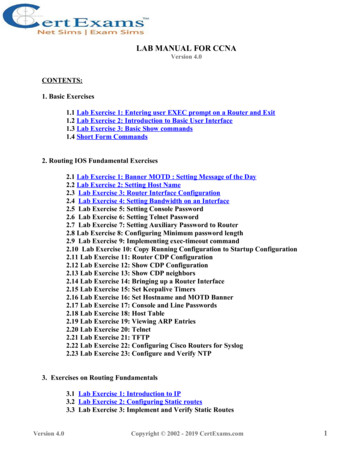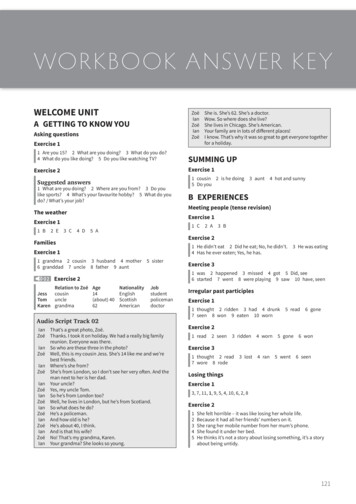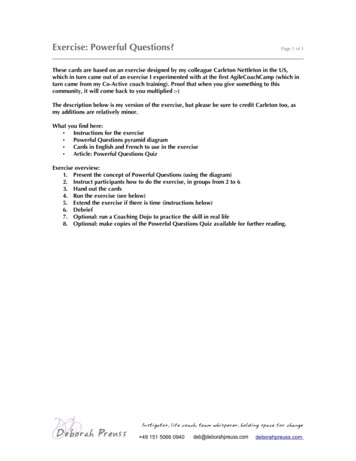
Transcription
Exercise: Powerful Questions?Page 1 of 3These cards are based on an exercise designed by my colleague Carleton Nettleton in the US,which in turn came out of an exercise I experimented with at the first AgileCoachCamp (which inturn came from my Co-Active coach training). Proof that when you give something to thiscommunity, it will come back to you multiplied :-)The description below is my version of the exercise, but please be sure to credit Carleton too, asmy additions are relatively minor.What you find here: Instructions for the exercise Powerful Questions pyramid diagram Cards in English and French to use in the exercise Article: Powerful Questions QuizExercise overview:1. Present the concept of Powerful Questions (using the diagram)2. Instruct participants how to do the exercise, in groups from 2 to 63. Hand out the cards4. Run the exercise (see below)5. Extend the exercise if there is time (instructions below)6. Debrief7. Optional: run a Coaching Dojo to practice the skill in real life8. Optional: make copies of the Powerful Questions Quiz available for further reading.Instigator, life coach, team whisperer, holding space for change 49 151 5066 0940deb@deborahpreuss.comdeborahpreuss.com
Exercise: Powerful Questions?Page 2 of 3Instructions:1. Present the concept of Powerful QuestionsTo introduce why you talk about this, you might want to: Explain the shift from tellingto coaching. From managing to self-organisation. Team wisdom. Holding space,listening.Resources: See the references at the end of the Quiz, if you want sources to inspire thisintroduction. You might like to watch my petcha kucha for inspiration offer---Reisen-mit-leichtem-Gepaeck055727.htmlIf you don't have time or don't want to try teaching the skill (you can do it!), you couldjust show the talk (6 minutes).Leave the triangle diagram visible as you teach and throughout the exercise.2. Instruct participants how to do the exerciseTell them they are going to work in groups to organise the cards into one row, frommost powerful (at the top) to least powerful (at the bottom) questions. Yes, just ONErow! Variation: first do it silently, then add talking.Note: I have not tried this yet. It probably takes longer. What happens?Set a clear timebox and if you can, let them see the timer as they work so they can selfmanage.Remind them that what's important are the conversations!3. Hand out the cardsOrganise people in triads (preferred) or groups, with one full card set per group.If there is time, have participants draw their own triangle diagram based on yours, foreach table. The act of collaborating and drawing builds engagement with the concepts.Otherwise make copies of the diagram available to participants as they work.Have one marker available to each group, but don't point it out (you want them tothink it is their own idea to start writing on the cards :-).(Note: I print the cards heavy paper or cover stock. But you could just as well writethem out by hand on sticknotes or stattys)Instigator, life coach, team whisperer, holding space for change 49 151 5066 0940deb@deborahpreuss.comdeborahpreuss.com
Exercise: Powerful Questions?Page 3 of 34. Run the exerciseFacilitators: circulate as teams start to work on the assigned task.Things to watch for, with questions to ask: one person doing all the work what do you others think? arguments remember that the conversations here are what's important:what are you learning in this case? too much detail please try to get through all the cards.How are you doing for time? Other questions to ask: what kind of question is that? how does context influence the power of this question?5. Extend the exercise if there is timeInstructions: use the rules of Powerful Questions to improve the weakest question youfound (write on the blank cards if you like)same instruction, this time for the most ambiguous questionIf you have time, and there is energy, continue to do some more.6. DebriefAsk the group meta questions: what happened? what surprised you? what complicated your discussions?keep it brief - rather than lots of discussion, better to practice with a dojo (next step).7. Optional: run a Coaching Dojo to practice the skill in real lifeRachel Davies invented 10/08/improving-agile-coaching-skills.htmlOthers have refined it: (see what else Google turns up, too!)Michael Sahota, for example: 8. Optional: make available copies of the Powerful Questions Quiz (below) for further reading.People might find my answers there unusual, and it has a reading list at the endInstigator, life coach, team whisperer, holding space for change 49 151 5066 0940deb@deborahpreuss.comdeborahpreuss.com
5Some questions areMore Powerfulmore powerfulfor effecting changeWhy ?How ?What ?Who, When, Where?Which? Yes/No QuestionsLess PowerfulTHE ART OF POWERFUL QUESTIONS: Catalyzing Insight, Innovation, and Actionby Eric E. Vogt, Juanita Brown, & David Isaacs ion Deborah Hartmann Preuss, 2009 – www.deborahpreuss.com
What did wedo wrong?Who is responsiblefor the buildbreaking?What if there wasan alternative wayto solve thisimpediment?How could we dothis Sprintdifferently than thelast?
PowerfulPowerfulQuestions ?Questions ?PowerfulPowerfulQuestions ?Questions ?
When did youbecome awareof this this issue?I wonder whatwould happenif we triedsomething different?Where were youwhen thishappened?Can you explainthat to me?
PowerfulPowerfulQuestions ?Questions ?PowerfulPowerfulQuestions ?Questions ?
I am curiousto hear moreabout what youwere thinking.How can we makea schedulethat meets thedeadline?Are you going todeliver this projecton time?Describe a timewhen this wasworking.
PowerfulPowerfulQuestions ?Questions ?PowerfulPowerfulQuestions ?Questions ?
What would be a better question?What would be a better question?What would be a better question?What would be a better question?
PowerfulPowerfulQuestions ?Questions ?PowerfulPowerfulQuestions ?Questions ?
What would be a better question?What would be a better question?This card deck was designed byDeborah Hartmann Preuss@deborahhhttp://abiggerga.meBased on an exercise designed byCarlton Nettleton@carlton858http:// http://lookforwardconsulting.comPlease use it freely, and with these attributions!What would be a better question?
PowerfulPowerfulQuestions ?Questions ?PowerfulPowerfulQuestions ?Questions ?
Qu’avons nousmal fait ?Qui est le responsablede ce build cassé ?Who is responsible for the build breaking?What did we do wrong?Et si il y’avait unesolution alternative?What if there was an alternative way to solve this impediment?Commentpourrions-nous fairece sprint différemmentque le précédent ?How could we do this Sprint differently than the last?
PowerfulPowerfulQuestions ?Questions ?PowerfulPowerfulQuestions ?Questions ?
Quand avez-vousdécouvertce problème ?Je me demande ce qu’ilse passerait si onfaisait différemment ?When did you become aware of this this issue?I wonder what would happen if we tried something different?Où étais-tu quandça s’est produit ?Where were you when this happened?Peux-tum’expliquer ça ?Can you explain that to me?
PowerfulPowerfulQuestions ?Questions ?PowerfulPowerfulQuestions ?Questions ?
Je serais curieusede savoir:à quoi tu pensais?Commentpourrions-nous planifiernotre travail pour arrivera temps?I am curious to hear more about what you were thinking.How can we make a schedule that meets the deadline?Vas-tu livrer ceprojet à temps ?Décrivez-moicomment c’étaitlorsque ça marchait?Are you going to deliver this project on time?Describe a time when this was working.
PowerfulPowerfulQuestions ?Questions ?PowerfulPowerfulQuestions ?Questions ?
Que serait une meilleure question?Que serait une meilleure question?Que serait une meilleure question?Que serait une meilleure question?
PowerfulPowerfulQuestions ?Questions ?PowerfulPowerfulQuestions ?Questions ?
Que serait une meilleure question?Que serait une meilleure question?This card deck was designed byDeborah Hartmann Preuss@deborahhhttp://abiggerga.meBased on an exercise designed byCarlton Nettleton@carlton858http:// http://lookforwardconsulting.comFrench translation in collaboration withValérie Taesch@valerie taeschPlease use it freely, and with these attributions!Que serait une meilleure question?
PowerfulPowerfulQuestions ?Questions ?PowerfulPowerfulQuestions ?Questions ?
Was haben wir falschgemacht?Wer ist dafürverantwortlich, dassdas Build nichtfunktioniert?What did we do wrong?Who is responsible for the build breaking?Was wäre, wenn es einenanderen Weg gäbe,dieses Hindernis zubeseitigen?Was können wir indiesem Sprint andersals im vorherigenmachen?What if there was an alternative way to solve this impediment?How could we do this Sprint differently than the last?
PowerfulPowerfulQuestions ?Questions ?PowerfulPowerfulQuestions ?Questions ?
Wann bist Du auf dasProblem aufmerksamgeworden?Ich frage mich, waspassieren würde, wennwir etwas anderesausprobieren würden.When did you become aware of this this issue?I wonder what would happen if we tried something different?Wo warst Du, als daspassiert ist?Where were you when this happened?Kanst Du mir daserklären?Can you explain that to me?
PowerfulPowerfulQuestions ?Questions ?PowerfulPowerfulQuestions ?Questions ?
Ich bin neugierig, mehrdarüber zu erfahren,was Du gedacht hast.Wie können wir einenPlan aufstellen, der denFertigstellungstermineinhält?I am curious to hear more about what you were thinking.How can we make a schedule that meets the deadline?Wirst Du dieses Projektrechtzeitig ausliefern?Beschreibe eineSituation, in der dasfunktioniert hat.Are you going to deliver this project on time?Describe a time when this was working.
PowerfulPowerfulQuestions ?Questions ?PowerfulPowerfulQuestions ?Questions ?
Was wäre eine bessere Frage?Was wäre eine bessere Frage?Was wäre eine bessere Frage?Was wäre eine bessere Frage?
PowerfulPowerfulQuestions ?Questions ?PowerfulPowerfulQuestions ?Questions ?
Was wäre eine bessere Frage?Was wäre eine bessere Frage?This card deck was designed byDeborah Hartmann Preuss@deborahhhttp://abiggerga.meBased on an exercise designed byCarlton omFor German translation, thanks go toNils Wloka@nilswloka http://nilswloka.comWas wäre eine bessere Frage?Please use it freely, and with these attributions!
PowerfulPowerfulQuestions ?Questions ?PowerfulPowerfulQuestions ?Questions ?
Wat deden weverkeerd?Wie is ervoorverantwoordelijk datde build gebroken is?What did we do wrong?Who is responsible for the build breaking?Wat nou als er eenalternatieve manierwas om deze blokkadeop te heffen?Hoe kunnen wedeze Sprintanders doendan de vorige?What if there was an alternative way to solve this impediment?How could we do this Sprint differently than the last?
PowerfulPowerfulQuestions ?Questions ?PowerfulPowerfulQuestions ?Questions ?
Wanneer werdjij je bewustvan dit probleem?When did you become aware of this this issue?Waar was jijtoen dit gebeurde?Where were you when this happened?Wat zou er gebeurenals we iets andersprobeerden?I wonder what would happen if we tried something different?Kun je dat aan meuitleggen?Can you explain that to me?
PowerfulPowerfulQuestions ?Questions ?PowerfulPowerfulQuestions ?Questions ?
Ik wil graagmeer horen overwat je (toen) dacht.I am curious to hear more about what you were thinking.Hoe maken we eenschema zodat we dedeadline wel halen?How can we make a schedule that meets the deadline?Ga je dit projectop tijd opleveren?Beschrijf wanneer dezeoplossing wel werkteAre you going to deliver this project on time?Describe a time when this was working.
PowerfulPowerfulQuestions ?Questions ?PowerfulPowerfulQuestions ?Questions ?
Wat zou een betere vraag zijn?Wat zou een betere vraag zijn?Wat zou een betere vraag zijn?Wat zou een betere vraag zijn?
PowerfulPowerfulQuestions ?Questions ?PowerfulPowerfulQuestions ?Questions ?
Wat zou een betere vraag zijn?Wat zou een betere vraag zijn?This card deck was designed byDeborah Hartmann Preuss@deborahhhttp://abiggerga.meBased on an exercise designed byCarlton Nettleton@carlton858http:// http://lookforwardconsulting.comDutch translation is a collaboration betweenLinda van der Pal / lvdpal@jduchess.orgMary Beijleveld / m.g.beyleveld@chello.nlPlease use it freely, and with these attributions!Wat zou een betere vraag zijn?
PowerfulPowerfulQuestions ?Questions ?PowerfulPowerfulQuestions ?Questions ?
Quiz: Powerful QuestionsPage 1 of 4"In coaching, powerful questions knock people off their automatic pilot program and makethem fly the airplane".-- Karen Kimsey-House, Henry Kimsey-House, Phillip Sandahl, in Co-Active Coaching:Changing Business, Transforming Lives (this is the recent, revised edition of the classic CoActive coaching text).I was introduced to the importance of Curiosity in coaching while going through Co-Active Coachtraining. One way to practice curiosity is to ask "powerful questions" - in Co-Active coaching thisterm denotes open questions asked to move a person or group toward something of importance tothem. Powerful questions operate by engaging the answerer's own curiosity to surface importantfacts, memories, assumptions, feelings and ideas. It is taught together with the Three Levels ofListening, because good listening skills enhance the ability to pose and use powerful questions.What do you know about asking questions that energise people to move forward in constructiveand innovative ways? Turn the page for my four-question quiz – I hope it teaches (or reminds) youof at least one practice for your people-skills toolkit!If you would like some further practice, I would be happy to run a Getting Unstuck workshop foryour group in Europe. In America, my colleague Carleton Nettleton runs similar workshops.Instigator, team whisperer, life coach , holding space for change 49 151 5066 0940deb@deborahpreuss.comdeborahpreuss.com
Quiz: Powerful QuestionsPage 2 of 4ONE: What makes a question "powerful"?A)B)C)D)E)F)It conveys the questioner's strong desire for change.It sets a clear direction for answerers to follow.It evokes the answerer's wisdom.It is specific to the answerer's context.It is easily answered.It has never been asked before.My answer is C.While a desire for change helps frame questions, and context sensitivity is very important, it is theeffect in the answerer that defines a powerful question. A powerful question cuts through old habits,defenses and assumptions, and invites the answerer to apply their wisdom in a fresh way. This mayor may not make it easy to answer. And the same question in different contexts may lead to a verydifferent outcome, so don't hesitate to re-use a question, when appropriate!A warning: be careful to look for and remove your own assumptions embedded in the question. Ifyour question embeds hidden assumptions or suggestions, people (ever eager to meet expectations!)may look for your answers rather than coming up with their own! This suggests that a little thinkingmight be in order, if you have the opportunity to prepare (often you don't, you just have to wing it,keep practising!)TWO: Which of these is (or are) evidence that question has been "powerful"?A)B)C)D)E)F)The energy in the room shifts.There is a pause, while a deep breath is taken.Body language indicates curiosity.One or more of the above may happen.It is impossible to tell right away.All of the above.My answer is D. And of course, an infinite number of other signalsWhile there are often long-term effects from a powerful question, its effect is almost always palpablewithin seconds, as the answerer wakes up, gets curious and begins to think differently. Those of uswho would use powerful questions must also develop deep listening skills: using eyes and ears andgut-feel. Listening helps before, when framing a question, and after, to detect how the question haslanded. And if a question does fall flat, be transparent: just acknowledge it and try again. When youare free to fail, so is your coachee. and this is just what we want to model. We "eat our owndogfood" when we fail without shame, learn from it and improve!Instigator, team whisperer, life coach , holding space for change 49 151 5066 0940deb@deborahpreuss.comdeborahpreuss.com
Quiz: Powerful QuestionsPage 3 of 4THREE: Which of these are sure to weaken the effect of a question?A)B)C)D)E)F)Feeling nervous and stumbling when posing the question.Already knowing the answer you want the answerers to discover.Presenting some possible answers, to get the ball rolling.Rephrasing it, to be sure it was understood.Allowing an awkward silence to lengthen after asking it.None of the above.My answer: B, C and D are sure to weaken a question.The problem illustrated here is that of being too "helpful," which may be more of an issue in somecultures than others (said the Canadian :-) While it may seem kind to soothe the answerer's anxietyby "helping" them with hints, if you really want powerful, helpful answers you must let kindness sitby the side, as it is this anxiety that irritates the oyster and seeds the pearl, to coin a metaphor.The answer to this natural temptation to "help" is to learn to WAIT. Practise waiting, even if youthink the question needs a little rephrasing (oh, this is a hard one for me!) Wait longer than youthink you should. If you feel pressured to talk, count to 20 (try this, it's harder than it sounds). If youhave the courage, count to 20 again! When it starts to get awkward, Diana Larsen sometimes says toa group "I bet I can wait longer than you can!" and continues to wait! With an individual it is easierto watch for non-verbal clues and be sensitive to their own timing. Remember that, with both groupsand individuals, the reply may come non-verbally. I once had a group reveal deep distress nonverbally, at which point the right question was: What is going on here now? And suddenly wemoved off a new and more deeply relevant direction.Here's something else to practice: while you wait, remain curious - *let go* of the outcome. Withan open question, you cannot know in advance where they will go with their answers, and if youtry to control or direct (i.e. suggesting there is a "correct answer") people may sit back and wait foryou to deliver your wisdom, short-cirtuiting the collaboration and innovation you seek.Items A and E, while awkward, may well become invisible once the answerer is engaged andthinking. A powerful question shifts the answerer's focus inward, and the asker's discomfort orimperfection quickly becomes irrelevant.FOUR: Which of the following statements about "Why.?" questions is/are FALSE?A) Research has found "Why" questions, in general, to be more powerful than "what," "when"and "which" questions.B) You can pose a "why" question without using "why".C) A "Why" question is the fastest way to the real root of any issue.D) A "why" question may need to be repeated to dig down.E) A "why" question can put answerers on the defensive.F) It doesn't matter who asks it - a solid "why" question always works.My answer is: C and F.Instigator, team whisperer, life coach , holding space for change 49 151 5066 0940deb@deborahpreuss.comdeborahpreuss.com
Quiz: Powerful QuestionsPage 4 of 4A "why" question may need to be repeated in different ways to get past the initial excuses,assumptions or "pat" answers - hence Lean Manufacturing's "5 whys" exercise. But be careful: a"Why" question can backfire powerfully, too, making "Why" a great way to NOT get to the rootcause. If people feel blamed, their energy will go towards hiding or justification, not memory andcreative thinking. For best results, use "why" questions in situations where mutual trust and respectexist. And beware: situations of inequality, despite respect, may in fact reduce trust: Questioningwhile towering over a seated person can send an unintentional message of inequality and pressure!And any question could land quite differently if asked by a peer or by the CEO. These effects can bereduced by paying attention to body language (again, a form of listening), or by rephrasing "why" ina less triggering way: "What made you choose that?" or "What is it that causes us to behave likethis?". These remain effectively "why" questions: digging for root causes while feeling less blaming.You can read a little about the research that revealed the differences between different sorts ofquestions in The Art of Powerful Questions, a pdf download on the World Cafe website. How doesthis relate to World Cafe? I have come to realise that many of our facilitation practices, includingWorld Cafe, are simply ways to set up a context in which we can use powerful questions to helppeople! A powerful question is a great way to "get the right people in the room", as when we makean invitation to an Open Space event.Do you wish you had a coach to ask you powerful questions when you get stuck?(Question: What's keeping you from getting a coach? :-)Here is my offer to you: The next best thing might be my Powerful Question cards, a free pdfdownload in English, German and Dutch. (Further translations are welcome).LinksCuriosity as a coaching context, from The Coaches media/Co-Active-Contexts-Curiosity.htmlCo-Active Coaching: Changing Business, Transforming Lives. Karen Kimsey-House, Henry Kimsey-House,Phillip Sandahl. (this is the recent, revised edition of the classic Co-Active coaching e Coach training from The Coaches Training Institutehttp://thecoaches.com/Three Levels of Listening, on the Co-Active Coaching /Co-Active-Contexts-Listening.htmlThe Art of Powerful Questions, a pdf download on the World Cafe werful Question cards, a free pdf download in English, German and ds.zipInstigator, team whisperer, life coach , holding space for change 49 151 5066 0940deb@deborahpreuss.comdeborahpreuss.com
Powerful Questions pyramid diagram Cards in English and French to use in the exercise Article: Powerful Questions Quiz Exercise overview: 1. Present the concept of Powerful Questions (using the diagram) 2. Instruct participants how to do the exercise, in groups from 2 to 6 3. Hand out the cards 4. Run the exercise (see below) 5.
